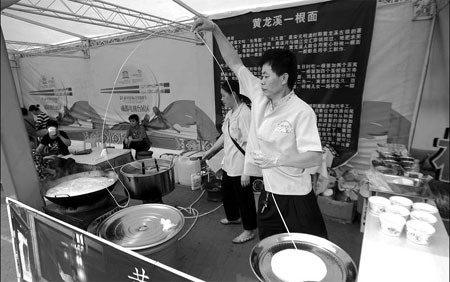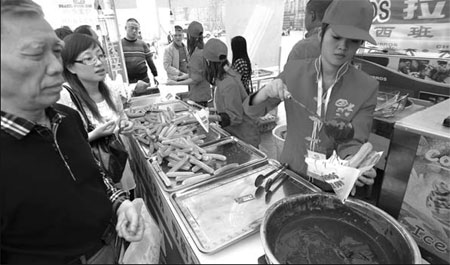Leisurely lifestyle joins a global gourmet culture
Updated: 2011-10-13 07:59
By Yang Cheng, Li Yu and Chai Hua (China Daily)
|
|||||||||||
|
A kitchen veteran demonstrates his skill at making one long, continuous noodle, during the Chengdu Food Festival. The dish is said to have originated in the Song Dynastry (960-1279) as an expression of longevity. Photos by Wang Qin / for China Daily |
|
A food vendor pours sauce over some churros, a popular snack, at the food festival. |
It's no exaggeration to say that absolutely every corner of Chengdu, capital of China's Sichuan province, in recent days has had a feast on offer, chosen from the richest array of global gourmet creations you could imagine.
No matter where you go in the city, there is a place to sit down and relax and have a taste of any kind of delicious food you want.
That's partly a result of the eighth China International Food and Tourism Festival, which just concluded on Oct 8.
But also because Chengdu was designated a "World gastronomy city" by the United Nations Educational, Scientific and Cultural Organization (UNESCO) in February of 2010, so it has a reputation to live up to.
It attracted 8 million visitors from all over for the festival, a 15-percent increase over last year, and it brought in 430 million yuan ($67.2 million) in receipts for participating companies, or about 39 million yuan per day.
Chinese and overseas media - for example, China Central Television, the New York Times, China Daily, Hong Kong's Wen Wei Po Daily, People.com - all ran special features on the event.
And there was not only the local "Chuan" flavor, whose home is Chengdu, on offer, but mouth-watering overseas delicacies as well.
There was one central venue, 13 alternative venues, and 44 interactive zones, across various districts and neighboring counties.
The central venue was the International Intangible Cultural Heritage Park in the Qingyang district, in the downtown area, which contains the home of the famous Tang Dynasty (AD 618-907) poet Du Fu.
The central site had around 330 companies taking part and 40 brand-name companies offering discounts on their top products.
On Jinli Street, near the Wuhou Temple a memorial to the politician Zhuge Liang, of the Three Kingdoms period (AD 220-280) - tourists could fork over just 1 yuan to get a taste of many local snacks.
The central district also offered healthy food in an area with the theme of "ecological green", where local restaurants had a set of exciting new dinner items with traditional folk songs as a backdrop.
In the Wuhou district, there were cooking competitions and food-related films to give a bit of spice to the festival.
Shuangliu county, next door, held a food fair along with a culture show based on the famous historical novel "Romance of the Three Kingdoms", written by Luo Guanzhong in the 14th century. The book covers the turbulent years near the end of the Western Han (206 BC -24 AD), and Eastern Han (AD 25-220) dynasties and the Three Kingdoms era (AD 220-280).
The organizing committee worked with Ctrip.com, a leading travel website, to provide pages of information about traffic, hotels, tourist spots and food services in Chengdu.
One crucial element of the festival was the "Food & Tourism Passport", which was officially announced at the start, and gave the holder discounts on various products.
It was good in 18 districts and counties and covered 71 different brands and local specialties and was available in places such as Kuanzhai Alley, Manjusri Mill, and the Jinsha Relics Museum.
Purchasers could also mail the passport back to the organizing committee to be included in a lucky draw. Top prizes included an airline ticket from Chengdu, two nights in a four-star hotel suite in Chengdu, and a ticket to various scenic spots in Chengdu. The two top prizes were provided by Ctrip, and the third by the Chengdu Tourism Administration.
Seven other towns of historical interest - Tai'an, Luodai, Huanglongxi, Jiezi, Anren, Pingle and Xilai - took advantage of the event by providing information about themselves to attract tourists.
The organizers also invited Chinese and foreign experts to a forum on soft power and the building of an international gastronomy city.
In addition, Chengdu reached a cooperation agreement with the Taiwan Restaurant and Taiwan Food Industry Association on training people for the food industry.
Then and now
Chengdu has a long historical record of food preparation and had China's first brewery, both of which were fundamental to its development. Some even claim that China's first professional cook was from Chengdu.
The city now has at least 6,000 different dishes, many of them delicate, which makes it one of the world's important catering centers.
And it has many well-known gourmet restaurants, four of which are recognized as Famous Chinese Brands and 13, as Time-honored Chinese Brands. At least 30 of its food items have been designated Famous Chinese Snacks.
The city considers itself quite open to food from other places and has, for example, brought together other prominent Chinese cuisines such as the Cantonese, Shandong and Huaiyang.
It also has a number of restaurants from other countries such as the United States, France, Japan, and Thailand.
In addition, Chengdu is the permanent home of the China Intangible Cultural Heritage Festival and is known for its leisurely lifestyle and good living conditions. Now, the gourmet culture has taken hold as an important part of its other rich cultural heritage.
Many of its streets and alleys have their own particularities, with gourmet restaurants and farmhouses that serve country-style cooking.
Taking a walk around those streets can give a person a taste of some interesting food, something that has become a must for both the Chinese and people from abroad.
China Daily
(China Daily 10/13/2011 page5)

